
Understanding human behavior, cognition, and emotions is the primary objective of psychology, a dynamic diverse discipline. But there are several enduring myths and falsehoods about the subject that cause people to misinterpret what psychology includes.
Many people still do not know what psychology includes and are confused about the subject. Psychology is not a popular academic field in India, and many people still hold it in low regard. Many individuals believe that psychologists only work with “pagal log.”
We set out to clear up some of the most common myths about psychology in this post in order to shed light on the reality about this fascinating subject.
Myth1: Mind Reading
One of the most pervasive beliefs is that psychologists can read people’s minds or have otherworldly abilities. Psychologists can’t read minds directly; instead, they employ a variety of techniques and empirical procedures to study behavior and cognition.
Myth2: Only for Mental Illness
Only mental illness is often linked to psychology. Psychologists do work with people who have mental health issues, but psychology is much more than that. In addition, psychology includes topics like social behavior, personality, cognitive processes, human development, and organizational psychology, among others.
Myth3: Psychology is just common sense
One popular misperception is that psychology only supports what we already know based on common sense. Psychology may study issues that appear intuitive, but it goes beyond a cursory grasp of the subject, using scientific techniques and thorough research to reveal the complexity of human behavior and cognitive processes.
Myth4: All psychologists are therapists
The field of psychology covers a much broader spectrum of professions, even though many psychologists do work as therapists or counselors. Research, teaching, consulting, forensic work, organizational development, sports psychology, and other activities are all possible for psychologists. Not just in clinical or counseling contexts, they make contributions to many different sectors.
Myth5: Seeking therapy means one is “crazy”
The belief that seeking therapy or counseling means a person is “crazy” or mentally ill is a common misconception. In actuality, counseling can be helpful for anyone dealing with difficulties in life, seeking personal development, or hoping to enhance wellbeing. It’s a proactive move in the direction of self-improvement, and asking for help from a professional is a display of strength and self-care.
Myth6: All About Mental Disorders
Psychology is frequently confused with mental disorders and abnormal conduct. Psychology is primarily concerned with understanding typical human behavior, cognition, emotions, and social interactions, while abnormal psychology is one area within the field of study. Equally important as investigating abnormal situations is understanding normal functioning.
Myth7: Quick Fixes
Offering quick fixes or miraculous treatments is not what psychology is about. It is a complicated and subtle discipline that values ongoing procedures, individual development, and long-term transformation. Individuals seeking assistance must invest time, effort, and active engagement in therapy and treatments.
Myth8: Psychology is a one-size-fits-all approach
Psychology acknowledges the complexity and diversity of each person. There is no one-size-fits-all approach to psychological ideas and interventions. Professionals adapt their strategies to the particular requirements, histories, and traits of individuals or groups. Effective psychological interventions include tailored assessments and culturally relevant procedures.
Conclusion
By dispelling these widespread misconceptions, we can promote a more accurate perception of psychology as a field of study that looks at human cognition, emotion, and behavior. A wide range of tasks and specialties are covered by psychology, which goes beyond common sense and makes use of rigorous research techniques. The pursuit of evidence-based techniques for personal development and wellbeing is encouraged by an understanding of the realities of psychology, which raises awareness, lessens stigma, and fosters these goals.
Swikriti Dandotia














